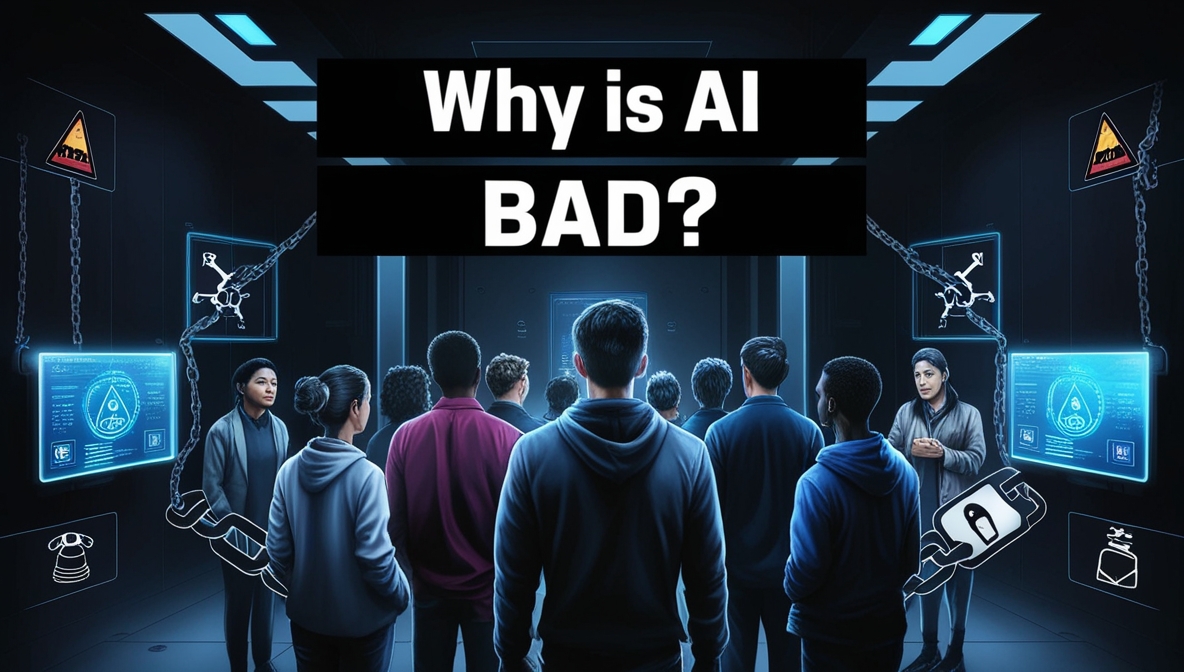Artificial Intelligence, or AI, is a powerful tool that can change how we live. But some people worry about it. They think that AI might make mistakes or act in ways that can harm us. For example, when machines get too smart, they might replace jobs people need or even do things on their own without human help. These worries make people wonder if AI is always a good thing.
In this article, we will discuss “Why is AI bad?” We will explore the concerns people have about AI, including job loss, privacy issues, and possible dangers from too much reliance on machines.
Loss of Jobs
One of the most pressing issues related to AI is job displacement. As technology advances, many industries are turning to automation to increase efficiency and reduce costs. This shift poses a serious threat to employment in several areas:
- Automation in Factories: Robotic systems are increasingly taking over tasks previously performed by humans, leading to significant job losses in manufacturing. While these robots enhance productivity, they eliminate the need for many factory workers.
- Chatbots Replacing Customer Support Roles: Many companies now use AI-powered chatbots to handle customer inquiries, reducing the demand for human customer service representatives. While chatbots can answer basic questions, they often lack the empathy and nuanced understanding that human agents provide.
- AI in Logistics Reducing Human Drivers: The rise of self-driving vehicles and AI in logistics is also reducing the need for human drivers. As companies invest in these technologies, traditional driving jobs are at risk of becoming obsolete.
Privacy Concerns
As AI systems gather and analyze large amounts of personal information, privacy has become a big worry. Many people don’t know how their data is being used or shared. Here are two main issues:
- Surveillance: AI tools like facial recognition are often used in public places, allowing constant monitoring of people without their permission. This can lead to a society where our privacy is at risk.
- Data Breaches: Collecting personal data can create security problems. When big companies experience data breaches, sensitive information can be exposed, putting people at risk of identity theft and other harmful actions.
Dependence on Technology
As AI continues to integrate into our daily lives, there is a growing concern about our increasing reliance on these systems:
- Weakening Problem-Solving Skills: Over time, as we depend on AI for everyday decisions—from navigation to financial planning—we may weaken our critical thinking and problem-solving abilities. Relying too heavily on AI can make us less adept at tackling challenges without technological assistance.
- Comfort in Decision-Making: People may become overly comfortable allowing AI to make decisions for them, which can lead to a diminished sense of agency. This dependence might hinder our ability to make informed choices or assess situations independently.
Challenges and Limitations of LLMs
- Bias in Responses: LLMs can reflect societal biases found in their training data, leading to biased information in their responses.
- Inaccuracy: They may provide inaccurate or misleading information, as they generate responses based on patterns rather than factual verification.
- Understanding Emotions: LLMs struggle to grasp complex human emotions, which can result in responses that lack empathy or nuance.
- Cultural Nuances: They may not fully understand cultural differences, leading to misunderstandings in communication.
- Context Limitations: LLMs can lose track of important details in long conversations, resulting in irrelevant responses.
- Training Data Dependence: Their performance relies heavily on the quality and diversity of the training data, which can impact inclusivity.
- Lack of True Understanding: LLMs don’t genuinely understand language; they mimic patterns, leading to responses that may sound correct but lack insight.
FAQs
Is AI dangerous to jobs?
Yes, AI can lead to job displacement as machines can perform certain tasks faster and more efficiently than humans.

Can AI lead to privacy issues?
Absolutely, AI systems often collect and analyze large amounts of personal data, raising privacy concerns.
Does AI have ethical concerns?
Yes, AI decisions can be biased or unfair if trained on biased data, which may result in unethical outcomes.
Is AI a threat to security?
AI can be misused for cyber-attacks, increasing security risks across various digital systems.
Conclusion
AI presents both opportunities and challenges. While it can enhance efficiency, its impact on jobs and privacy raises valid concerns. Many people fear losing their jobs to machines and worry about their personal data being misused.
Moreover, the increasing dependence on AI can weaken our decision-making skills and critical thinking. Addressing these issues is vital to ensure that we can enjoy the benefits of AI without sacrificing our jobs and privacy. Finding a balance between technology and human skills is essential for a better future.
P.S.: If you’re interested, transform text into quality speech instantly with our Text to Speech tool!